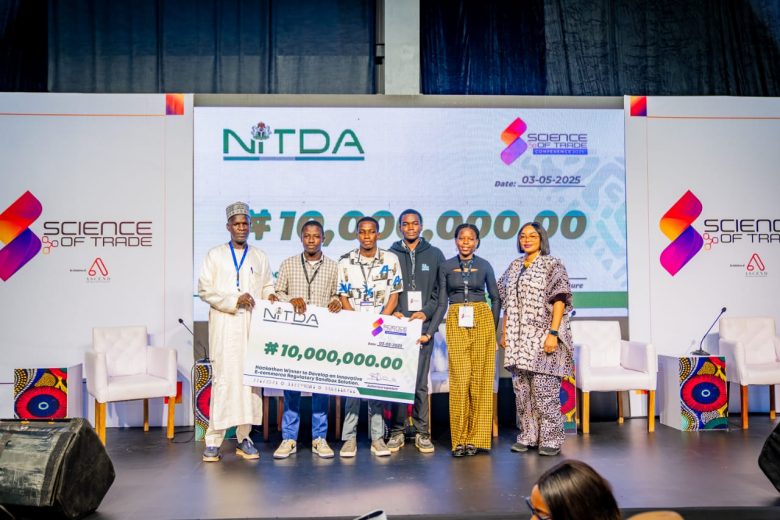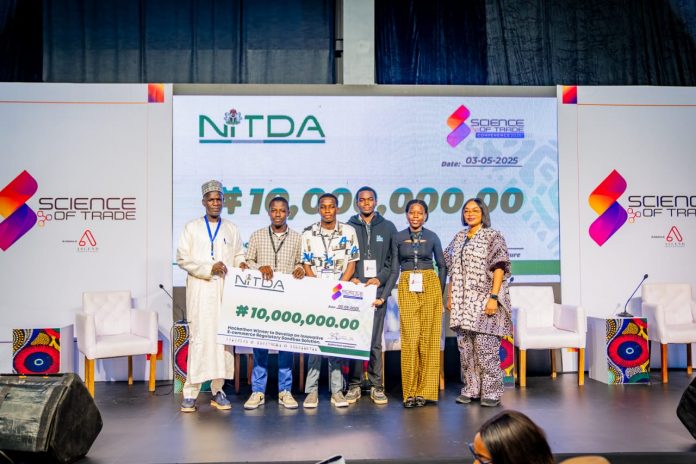The revolutionary potential of emerging technologies is essential to transforming trade and investment throughout Africa, according to Kashifu Inuwa, Director General of the National Information Technology Development Agency (NITDA).
Speaking as the keynote speaker at the Nigeria AfCFTA Hackathon 2025, which was a part of the Science of Trade Conference in Lagos State, he emphasised the ways in which digital innovation may promote inclusivity, efficiency, and long-term economic prosperity.
The African Continental Free Trade Area (AfCFTA), which unites more than 1.4 billion people with a combined GDP of over $3 trillion, is one of the world’s largest free trade zones, according to the DG, who was represented by Engr. Salisu Kaka, Director of the Digital Economy Development Department.
He called the recent implementation of the AfCFTA Digital Trade Protocol a significant turning point that will remove trade restrictions, simplify procedures, and allow companies of all kinds to access new markets.
“Nigeria, with its population of over 200 million and strong entrepreneurial culture, is uniquely positioned to lead Africa’s digital transformation”, he said.

While pointing out the rise of e-commerce and mobile payments as game changers, Inuwa said “From Abuja, I can order products online, conduct due diligence, make payments, and receive deliveries—technology has made trade seamless.”
“This Hackathon arrives at a crucial time following the African Union’s 2024 endorsement of the Digital Trade Protocol. It aims to harmonise digital regulations and eliminate trade barriers across all 54 African nations,” he added.
While global technological advancements have changed the nature of commerce, Inuwa emphasised that many African trade systems continue to be hampered by antiquated practices, copious amounts of paperwork, and logistical impediments. However, with to advancements like blockchain, artificial intelligence, the Internet of Things, and digital platforms, which are now essential to trade operations, a change is taking place.
He cited the success of Nigeria Customs Service (NCS) in leveraging technology through the Nigeria Integrated Customs Information System (NICIS II), which automated key processes like declarations, cargo tracking, and risk assessment—leading to a 238% revenue increase between 2017 and 2023. The Unified Customs Management System, introduced in December 2024 as a successor to NICIS II, has already generated over ₦31 billion, showcasing Nigeria’s progress in digital trade facilitation.
The Hackathon is structured around five priority areas: Youth and MSME Inclusion, E-Commerce Adoption, E-Commerce Policy and Trust, Digital Payments, and the E-Commerce Regulatory Sandbox. These are sectors where digital tools can significantly enhance trade dynamics.
“I’m confident that the Hackathon will spark innovative, scalable solutions to boost intra-African e-commerce, streamline cross-border transactions, and empower MSMEs with digital capabilities to compete globally,” Inuwa stated.
He described the event as a springboard for innovations that will simplify payments, promote inclusion, and reinforce Nigeria’s leadership in actualising the AfCFTA digital economy framework.
In his welcome address, Dr. Olusegun Awolowo, National Coordinator of the Nigeria AfCFTA Coordination Office—represented by Olusegun Olutayo, Senior International Trade Policy and Law Expert, emphasised that transformation is a continuous journey. He highlighted the continent’s focus on collaboration, innovation, and inclusive growth as essential to establishing Africa as a hub for digital trade.
Awolowo reaffirmed the transformative potential of the African Continental Free Trade Area (AfCFTA), emphasising that it presents Africa as a unified market of over one billion people—a vast opportunity for intra-African trade, investment, and economic growth.
He stressed that realising this vision requires active participation and shared ownership. According to him, the Hackathon is a tangible mechanism for implementing the AfCFTA Digital Trade Protocol—prioritising inclusion, innovation, and equitable access. It is expected to generate actionable solutions that bridge policy and practice, accelerating Africa’s digital economy and empowering the next generation of African innovators.


